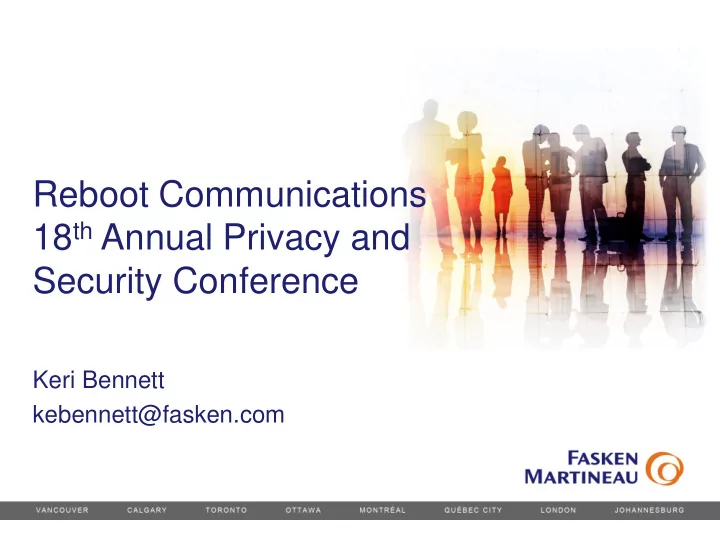

Reboot Communications 18 th Annual Privacy and Security Conference Keri Bennett kebennett@fasken.com
Drones and Privacy: The Regulatory Landscape • March 2013 Report: Research Group of the Office of the Privacy Commissioner of Canada: – Drones in Canada: Will the proliferation of domestic drone use in Canada raise new concerns for privacy?
Drones and Privacy: The Regulatory Landscape • May 28, 2015: Notice of Proposed Amendment (NPA): Unmanned Air Vehicles – Issued by the Canadian Regulations Advisory Council – Proposed a number of regulatory changes – Committed to working with the Office of the Privacy Commissioner “to emphasize the applicability and role of Canada’s privacy sector laws to the operations of UAVs by public and private sector organizations”
Applicable Privacy Laws • Federal – Personal Information Protection and Electronic Documents Act, SC 2000, c. 5 (“PIPEDA”) – Privacy Act, RSC 1985, c. P-21 • BC – Personal Information Protection Act, SBC 2003, c. 63 (“PIPA”) – Freedom of Information and Protection of Privacy Act, RSBC 1996, c. 165 (“FOIPPA”)
What is “Personal Information”? • PIPEDA: “Personal information” means information about an identifiable individual • PIPA: “Personal information" means information about an identifiable individual and includes employee personal information but does not include: (a) contact information, or (b) work product information • FOIPPA: “Personal information" means recorded information about an identifiable individual other than contact information
PIPEDA • General rule: organizations require consent to collect, use and disclose personal information subject to only limited and specific exceptions • Collection and use of personal information should only be for purposes that a “reasonable” person would consider appropriate in the circumstances • Organizations should consider employing less privacy-invasive means of obtaining information
PIPEDA • PIPEDA does not apply to: • Any individual in respect of personal information that the individual collects, uses or discloses for personal or domestic purposes and does not collect, use or disclose for any other purpose; • Organization in respect of personal information that the organization collects, uses or discloses for journalistic, artistic or literary purposes and does not collect, use or disclose for any other purpose
PIPA (BC) • “organization " includes a person, an unincorporated association, a trade union, a trust or a not-for-profit organization, but does not include: • (a) an individual acting in a personal or domestic capacity or acting as an employee
Privacy Act (BC) Privacy Act , RSBC 1996, c. 373 • Allows individuals to commence a civil action in tort for ”violation of privacy” • Fact based assessment – “nature and conduct of the act” – “degree of relationship between the parties” • Principle of reasonableness applies to the “nature and degree of privacy”
Intrusion on Seclusion • Jones v. Tsige - the common law tort of intrusion upon seclusion or solitude • Ontario unlike BC has no statute recognizing a cause of action for damages for invasion of personal privacy • Case involved an employee who was surreptitiously looking at the banking records of another employee after the searcher had formed a common law relationship with the searchee’s former husband
Intrusion on Seclusion Cont’d • Ontario court found that it could recognize a common law tort for invasion of privacy described as an intrusion upon the plaintiff’s seclusion or solitude (2012 ONCA 32) • Elements of the tort of intrusion include intentional or reckless conduct on the part of the defendant, an invasion of the plaintiff’s private affairs without lawful justification, and an invasion that a reasonable person would regard as highly offensive and that causes plaintiff duress, humiliation or anguish
Keri Bennett Associate +1 604 631 4947 kebennett@fasken.com
Recommend
More recommend